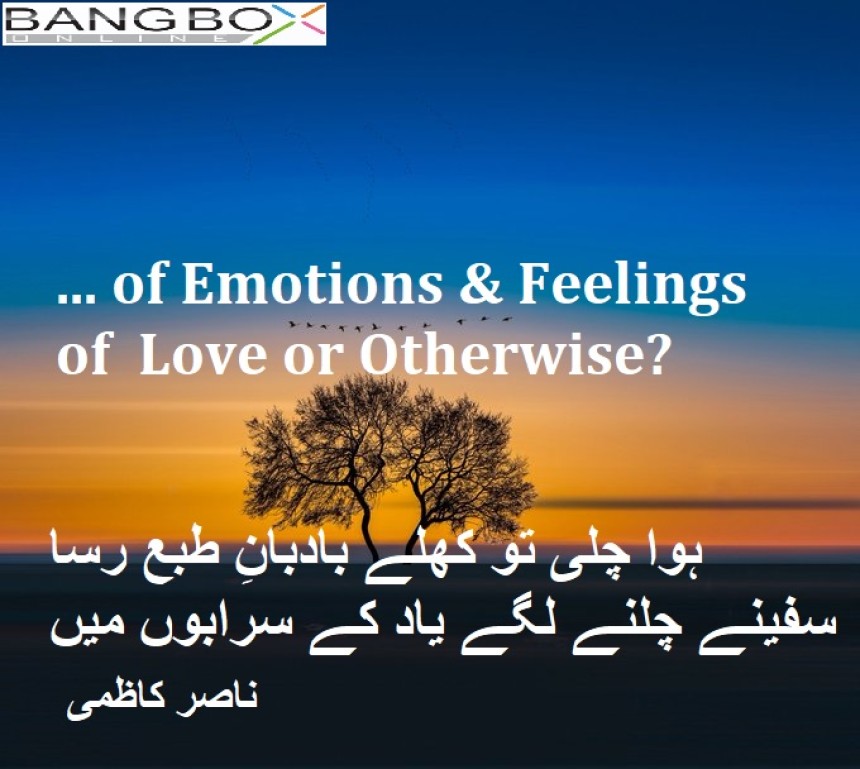
…of emotions and feelings of love and otherwise?
Emotions are sensations in physical sense and feelings generate from the thoughts about those emotions. We can say that feelings are the words which we give to our emotions to interpret our moods. The month of January is the beginning of year and it awakes hope for the best in future. This write up is a summarized attempt in the same way.
2024-01-20 15:07:16 - Muhammad Asif Raza
The God of Love By George MacBeth
The musk-ox is accustomed to near-Arctic conditions. When danger threatens, these beasts cluster together to form a defensive wall, or a “porcupine”, with the calves in the middle. – Dr Wolfgang Engelhart
The poem, “The God of Love”, is an eye-witness account, "I found them," with authority about the herd of musk-oxen.
The poem's dominant religious symbol is prefigured early on in the image of the "ark of horn". The ark is static, enshrining the sacred.
The Scottish poet's tragic ode to a herd of musk oxen unfolds as a warning against defensive masculinist values۔
I found them between far hills, by a frozen lake.
On a patch of bare ground. They were grouped
In a solid ring, like an ark of horn. And around
Them circled, slowly closing in,
Their tongues lolling, their ears flattened against the wind,
A whirlpool of wolves. As I breathed, one fragment of bone and
Muscle detached itself from the mass and
Plunged. The pad of the pack slackened, as if
A brooch had been loosened. But when the bull
Returned to the herd, the revolving collar was tighter. And only
The windward owl, uplifted on white wings
In the glass of air, alert for her young,
Soared high enough to look into the cleared centre
And grasp the cause. To the slow brain
Of each beast by the frozen lake what lay in the cradle of their crowned
Heads of horn was a sort of god-head. Its brows
Nudged when the arc was formed. Its need
Was a delicate womb away from the iron collar
Of death, a cave in the ring of horn
Their encircling flesh had backed with fur. That the collar of death
Was the bone of their own skulls: that a softer womb
Would open between far hills in a plunge
Of bunched muscles: and that their immortal calf lay
Dead on the snow with its horns dug into
The ice for grass: they neither saw nor felt. And yet if
That hill of fur could split and run – like a river
Of ice in thaw, like a broken grave –
It would crack across the icy crust of withdrawn
Sustenance and the rigid circle
Of death be shivered: the fed herd would entail its under-fur
On the swell of a soft hill and the future be sown
On grass, I thought. But the herd fell
By the bank of the lake on the plain, and the pack closed,
And the ice remained. And I saw that the god
In their ark of horn was a god of love, who made them die.
(Taken from https://www.theguardian.com/books/booksblog/2010/jun/07/poem-week-god-love-macbeth )
Benighted in the Foothills of the Cairngorms: January
By Olive Fraser
Olive Fraser (20 January 1909 – 9 December 1977) was a Scottish poet born in Aberdeen. Both her parents immigrated to Australia within a year of her birth, leaving Olive living with her great aunt in Nairn. She won the Calder Prize for English verse while studying English at the University of Aberdeen, and the Chancellor's Medal for English Verse at University of Cambridge in 1935, but did not complete her studies at Cambridge for health reasons. Most of her works were published posthumously.
Cauld, cauld is Alnack . . .
Cauld is the snaw wind and sweet.
The maukin o’ Creagan Alnack
Has snaw for meat.
Nae fit gangs ayont Caiplich
Nae herd in the cranreuch bricht.
The troot o’ the water o’ Caiplich
Dwells deep the nicht.
On a’ the screes, by ilk cairn
In the silence nae grouse is heard,
But the eagle abune Geal Charn
Hings like a swerd.
Yon’s nae wife’s hoose ayont A’an
In the green lift ava
Yon’s the cauld lums o’ Ben A’an
Wha’s smeek is sna.
A’ the lang mountains are silent
Alane doth wild Alnack sing.
The hern, the curlew are silent.
Silent a’ thing.
(Taken from https://www.scottishpoetrylibrary.org.uk/poem/benighted-foothills-cairngorms-january/ )
Below is the image of the Mountains of Cairngorms
جب اگلے سال یہی وقت آ رہا ہوگا
یہ کون جانتا ہے کون کس جگہ ہوگا
تو میرے سامنے بیٹھا ہے اور میں سوچتا ہوں
کہ آئے لمحوں میں جینا بھی اک سزا ہوگا
ہم اپنے اپنے بکھیڑوں میں پھنس چکے ہوں گے
نہ تجھ کو میرا نہ مجھ کو ترا پتا ہوگا
یہی جگہ جہاں ہم آج مل کے بیٹھے ہیں
اسی جگہ پہ خدا جانے کل کو کیا ہوگا
یہی چمکتے ہوئے پل دھواں دھواں ہوں گے
یہی چمکتا ہوا دل بجھا بجھا ہوگا
لہو رلائے گا وہ دھوپ چھاؤں کا منظر
نظر اٹھاؤں گا جس سمت جھٹپٹا ہوگا
بچھڑنے والے تجھے دیکھ دیکھ سوچتا ہوں
تو پھر ملے گا تو ......... کتنا بدل چکا ہوگا
ریاض مجید
جو ہم پہ گزرے تھے رنج سارے، جو خود پہ گزرے تو لوگ سمجھے
جب اپنی اپنی محبتوں کے عذاب جھیلے تو لوگ سمجھے
وہ جن درختوں کی چھاؤں میں سے مسافروں کو اٹھا دیا تھا
انہیں درختوں پہ اگلے موسم جو پھل نہ اترے تو لوگ سمجھے
اس ایک کچی سی عمر والی کے فلسفے کو کوئی نہ سمجھا
جب اس کے کمرے سے لاش نکلی، خطوط نکلے تو لوگ سمجھے
وہ خواب تھے ہی چنبیلیوں سے، سو سب نے حاکم کی کر لی بیعت
پھر اک چنبیلی کی اوٹ میں سے ، جو سانپ نکلے تو لوگ سمجھے
وہ گاؤں کا اک ضعیف دہقاں، سڑک کے بننے پہ کیوں خفا تھا
جب ان کے بچے جو شہر جاکر کبھی نہ لوٹے تو لوگ سمجھے
احمد سلمان
